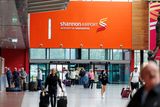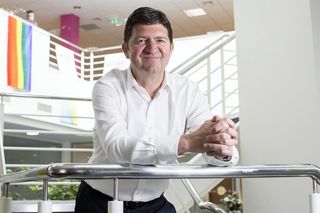Russian advance into Irish tech sector facilitated by Bono/Enda double act
Gerry McCarthy, EI's man in Russia
Kaspersky Lab, the global cyber security firm, is joining "waves" of Russian start-ups, developers and programmers who are flocking to Dublin.
The firm, whose founder Eugene Kaspersky was educated at a KGB-backed institute, plans to set up "a significant R&D centre" in Dublin and is already hiring. The agreement for the Moscow-based company to come to Ireland was sealed by the IDA after Kaspersky met with Taoiseach Enda Kenny and U2 frontman Bono, according to two sources close to the deal.
"We choose Dublin because we see it as a great opportunity to access a highly qualified European talent pool," Alexander Moiseev, managing director at Kaspersky, told the Sunday Independent. "At this early stage, we don't have the exact number of employees confirmed, but we are very interested in speaking with as many appropriately skilled candidates as possible."
Kaspersky, which is the fourth biggest seller of anti-virus software, operates in 200 countries and has 37 offices in 32 countries with almost 3,300 highly trained specialists.
The company is in the vanguard of Russian tech start-ups and talented IT personnel who are relocating to Dublin as Russia struggles to emerge from its deepest recession since 2008.
"There are waves of people from Russia going to Dublin to work with Facebook, Twitter and Google or getting contracts locally in Russia to work remotely," said Gerry McCarthy, head of Enterprise Ireland in Russia.
Enterprise Ireland has already spent over €1m in bringing five Russian tech companies to Dublin in the past year, under the umbrella of its new Competitive Start-up Fund. The agency provides the Russians with support to secure visas and accommodation as well as mentoring.
The fund is open to start-ups from all around the world, but a third of its 100 applications last year come from Russia or Russian-speaking Belarus and Ukraine. A new programme is already underway this year with a similar level of interest from Russia.
One of the companies, InnaLabs, is already firmly established and has 50 employees working in manufacturing gyroscopes and accelerometers based on intellectual property generated in Russia and redesigned in Ireland.
Retail analytics service CountBox got €250,000 and a similar amount was given to Eiratech to develop robotic warehousing.
"These are not grants," explained McCarthy. "They are investments through convertible loans. This first investment is a percentage that the company can always buy back. For us, it is a guarantee that the money will go towards building something in the long term. For the companies, this guarantees our ongoing interest in their development. However, the company is required to move to Ireland, and to make its key decisions there."
Constantin Gurdgiev, Professor of Finance at the Middlebury Institute of International Studies and a former head of the Irish Russian Business Association, said the amount of talented IT personnel leaving Russia doesn't represent a brain drain.
"A brain drain is when there's a permanent outflow of talent," said Gurdgiev. "These companies retain work and investment in Russia and will develop skills and critical access to US and European markets before re-entering Russia."
The relocation of Russian tech firms to Dublin comes as Ireland is about to send its first ever delegation to President Vladimir Putin's 'Davos Forum' in St Petersburg.
The delegation, which plans to host its own investor roundtable, will be led by Ireland's Ambassador Adrian McDaid, Enterprise Ireland's Russia head McCarthy and Terence O'Rourke of KPMG, chairman of Enterprise Ireland and former managing partner at KPMG.
The St Petersburg International Economic Forum, which runs for three days starting June 16, has been compared to the annual January gathering of world leaders and executives in the Swiss resort of Davos.
Hosted by President Putin in his hometown of St Petersburg - the former capital of imperial Russia - the event typically draws hundreds of global CEOs eager to network with officials, party with clients, and do deals with oligarchs.
However, attendance by Western CEOs has faded since the US and EU imposed sanctions on Russian officials, banks and companies over the Kremlin's involvement in the Ukraine conflict. The Russian foreign ministry complained earlier this month about pressure the US embassy in Bern was putting on Swiss business leaders not to attend.
Ireland's participation comes as Irish exports to Russia have tumbled by 55pc due to counter sanctions imposed by the Kremlin on the importation of meat, dairy, fish and other foodstuffs.
Join the Irish Independent WhatsApp channel
Stay up to date with all the latest news














